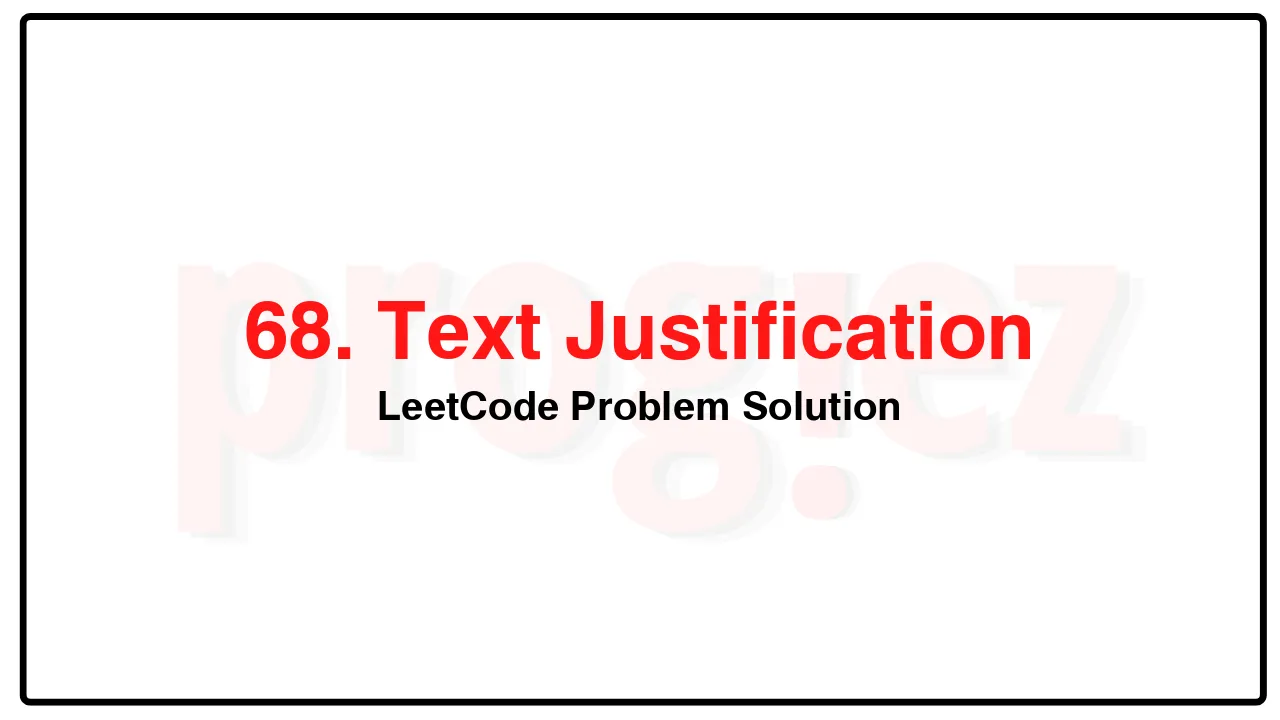68. Text Justification LeetCode Solution
In this guide, you will get 68. Text Justification LeetCode Solution with the best time and space complexity. The solution to Text Justification problem is provided in various programming languages like C++, Java, and Python. This will be helpful for you if you are preparing for placements, hackathons, interviews, or practice purposes. The solutions provided here are very easy to follow and include detailed explanations.
Table of Contents
- Problem Statement
- Complexity Analysis
- Text Justification solution in C++
- Text Justification solution in Java
- Text Justification solution in Python
- Additional Resources

Problem Statement of Text Justification
Given an array of strings words and a width maxWidth, format the text such that each line has exactly maxWidth characters and is fully (left and right) justified.
You should pack your words in a greedy approach; that is, pack as many words as you can in each line. Pad extra spaces ‘ ‘ when necessary so that each line has exactly maxWidth characters.
Extra spaces between words should be distributed as evenly as possible. If the number of spaces on a line does not divide evenly between words, the empty slots on the left will be assigned more spaces than the slots on the right.
For the last line of text, it should be left-justified, and no extra space is inserted between words.
Note:
A word is defined as a character sequence consisting of non-space characters only.
Each word’s length is guaranteed to be greater than 0 and not exceed maxWidth.
The input array words contains at least one word.
Example 1:
Input: words = [“This”, “is”, “an”, “example”, “of”, “text”, “justification.”], maxWidth = 16
Output:
[
“This is an”,
“example of text”,
“justification. ”
]
Example 2:
Input: words = [“What”,”must”,”be”,”acknowledgment”,”shall”,”be”], maxWidth = 16
Output:
[
“What must be”,
“acknowledgment “,
“shall be ”
]
Explanation: Note that the last line is “shall be ” instead of “shall be”, because the last line must be left-justified instead of fully-justified.
Note that the second line is also left-justified because it contains only one word.
Example 3:
Input: words = [“Science”,”is”,”what”,”we”,”understand”,”well”,”enough”,”to”,”explain”,”to”,”a”,”computer.”,”Art”,”is”,”everything”,”else”,”we”,”do”], maxWidth = 20
Output:
[
“Science is what we”,
“understand well”,
“enough to explain to”,
“a computer. Art is”,
“everything else we”,
“do ”
]
Constraints:
1 <= words.length <= 300
1 <= words[i].length <= 20
words[i] consists of only English letters and symbols.
1 <= maxWidth <= 100
words[i].length <= maxWidth
Complexity Analysis
- Time Complexity: O(\Sigma |\texttt{words[i]}|)
- Space Complexity: O(1)
68. Text Justification LeetCode Solution in C++
class Solution {
public:
vector<string> fullJustify(vector<string>& words, size_t maxWidth) {
vector<string> ans;
vector<string> row;
size_t rowLetters = 0;
for (const string& word : words) {
// If we place the word in this row, it will exceed the maximum width.
// Therefore, we cannot put the word in this row and have to pad spaces
// for each word in this row.
if (rowLetters + row.size() + word.length() > maxWidth) {
const int spaces = maxWidth - rowLetters;
if (row.size() == 1) {
// Pad all the spaces after row[0].
for (int i = 0; i < spaces; ++i)
row[0] += " ";
} else {
// Evenly pad all the spaces to each word (expect the last one) in
// this row.
for (int i = 0; i < spaces; ++i)
row[i % (row.size() - 1)] += " ";
}
ans.push_back(join(row, ""));
row.clear();
rowLetters = 0;
}
row.push_back(word);
rowLetters += word.length();
}
ans.push_back(ljust(join(row, " "), maxWidth));
return ans;
}
private:
string join(const vector<string>& words, const string& s) {
string joined;
for (int i = 0; i < words.size(); ++i) {
joined += words[i];
if (i != words.size() - 1)
joined += s;
}
return joined;
}
string ljust(string s, int width) {
for (int i = 0; i < s.length() - width; ++i)
s += " ";
return s;
}
};
/* code provided by PROGIEZ */68. Text Justification LeetCode Solution in Java
class Solution {
public List<String> fullJustify(String[] words, int maxWidth) {
List<String> ans = new ArrayList<>();
List<StringBuilder> row = new ArrayList<>();
int rowLetters = 0;
for (final String word : words) {
// If we place the word in this row, it will exceed the maximum width.
// Therefore, we cannot put the word in this row and have to pad spaces
// for each word in this row.
if (rowLetters + row.size() + word.length() > maxWidth) {
final int spaces = maxWidth - rowLetters;
if (row.size() == 1) {
// Pad all the spaces after row[0].
for (int i = 0; i < spaces; ++i)
row.get(0).append(" ");
} else {
// Evenly pad all the spaces to each word (expect the last one) in
// this row.
for (int i = 0; i < spaces; ++i)
row.get(i % (row.size() - 1)).append(" ");
}
final String joinedRow =
row.stream().map(StringBuilder::toString).collect(Collectors.joining(""));
ans.add(joinedRow);
row.clear();
rowLetters = 0;
}
row.add(new StringBuilder(word));
rowLetters += word.length();
}
final String lastRow =
row.stream().map(StringBuilder::toString).collect(Collectors.joining(" "));
StringBuilder sb = new StringBuilder(lastRow);
final int spacesToBeAdded = maxWidth - sb.length();
for (int i = 0; i < spacesToBeAdded; ++i)
sb.append(" ");
ans.add(sb.toString());
return ans;
}
}
// code provided by PROGIEZ68. Text Justification LeetCode Solution in Python
class Solution:
def fullJustify(self, words: list[str], maxWidth: int) -> list[str]:
ans = []
row = []
rowLetters = 0
for word in words:
# If we place the word in this row, it will exceed the maximum width.
# Therefore, we cannot put the word in this row and have to pad spaces
# for each word in this row.
if rowLetters + len(word) + len(row) > maxWidth:
for i in range(maxWidth - rowLetters):
row[i % (len(row) - 1 or 1)] += ' '
ans.append(''.join(row))
row = []
rowLetters = 0
row.append(word)
rowLetters += len(word)
return ans + [' '.join(row).ljust(maxWidth)]
# code by PROGIEZAdditional Resources
- Explore all LeetCode problem solutions at Progiez here
- Explore all problems on LeetCode website here
Happy Coding! Keep following PROGIEZ for more updates and solutions.